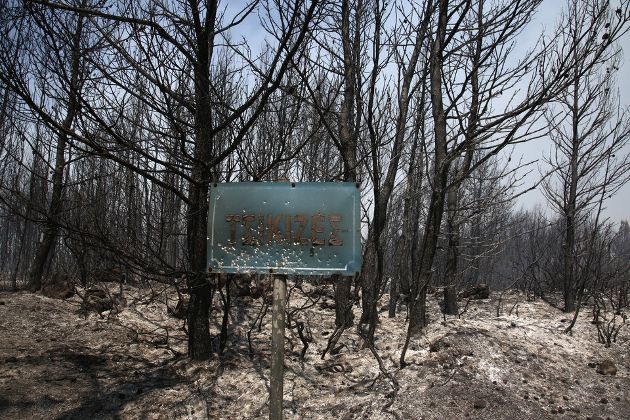-
 Is the Greek green transition running out of power?
Is the Greek green transition running out of power?
-
 Podcast - Walking a tightrope: Greece’s geopolitical balancing act
Podcast - Walking a tightrope: Greece’s geopolitical balancing act
-
 From nice story to pulped fiction: Carney delivers reality check on rules-based order
From nice story to pulped fiction: Carney delivers reality check on rules-based order
-
 Record bonds, rising bills: Greece’s economic paradox
Record bonds, rising bills: Greece’s economic paradox
-
 Podcast - Tax cuts and balancing acts: Greece's 2026 budget
Podcast - Tax cuts and balancing acts: Greece's 2026 budget
-
 Podcast - Main character energy: Greece vies for leading fossil fuel role
Podcast - Main character energy: Greece vies for leading fossil fuel role
Open wounds that burn forests

Ninety-one forest fires within 24 hours were recorded in Tuesday’s report by the Fire Service.
After the distress of the extensive destruction on Kythira, it was the turn of Zakynthos, which holds the “hot” record of 66 fires since the start of the summer.
Next comes East Attica, which had already lost 20,500 hectares in the mega-wildfire of Grammatiko in 2009.
We heard the Justice Minister Stavros Kontonis speaking of an organised plan to destabilise the country. How responsible can such a conspiratorial statement be, while the crisis is still unfolding and the Fire Service has not yet spoken on the causes? Rewind to ten years ago, when the then Prime Minister made exactly the same assertion, in a country which was mourning dozens of fatalities, the loss of hundreds of thousands of hectares of priceless forest and inestimable damage to property.
On that occasion, it was shown that Greece suffered from a conspiracy of criminal negligence, unprecedented drought and poor coordination.
Yes, most forest fires have a human cause. However, based on official statistics up until 2008, 40 percent of forest fires whose causes are established have been started by negligence, and only 11 percent by intentional arson.
A study conducted by WWF Greece and the National Agricultural Research Foundation, covering the period 1983-2008, showed that in 51 percent of forest fires, the causes are never properly established.
Out of the remaining 49 percent, 16.5 percent are ignited by fires lit to clear reeds or pasture, 2.6 percent by outdoor work (such as welding or beekeeping), 2.8 percent by burning rubbish, 4 percent by lightning, 2.5 percent by cigarettes, 1 percent by electrical short circuits, and 0.3 by pyromaniacs or mentally ill individuals.
On a regional basis, the largest number of wildfires by area unit was recorded in Kefalonia, Corfu and Zakynthos.
Until the Fire Service has published its evidence on the cause of the fires, we must refrain from making uninformed statements.
The evidence provided by the European fire monitoring service give cause for concern: this year, forest fires in Spain, Portugal and France stared already in January.
In France, several fires were recorded in the Pyrinées region in February. In Italy, there has been an endless catalogue of fires, starting in Turin in January.
There were also many fires in Albania, Croatia and Montenegro.
In our beautiful forests, fires have always occurred and will continue to occur. There is now an increased risk in mega-events, as climate change is making dry winters and long summer heatwaves more likely.
The challenge for everyone is the timely protection and prevention, as well as good organisation and coordination during a crisis.
However, there are open wounds which must heal. The biggest of these are political.
-
Forests open to encroachment. Although the first flames in a forest lead everyone to speculate foul play, the truth is that is no more necessary to burn a forest to build in it. It is also possible to open the land to construction simply by clearing it, as it is now easier to retrospectively legitimise illegal buildings. The Environment Ministry recently extended the deadline for legalising illegal constructions to 49 months. There is also legislation being drafted for a new round of legalisations of illegal constructions. Anyone building illegally on forest land can also claim compensation for damages from forest fires, as also demand public investment in infrastructure.
-
Weakened Fire Service. This year the Fire Service is starting with 700 fewer firefighters, predominantly due to the need to staff airports and national roads. The shortages in personal protection gear and mechanised equipment are tragic.
-
Volunteers ready, but unprotected. Thousands of volunteer firefighters remain uninsured and are still awaiting their full deployment in the national fire protection system. In case of injury, they foot the bill for their own treatment costs, having already volunteered their service in the public interest. We know that positive steps are being taken to address this, but a lot remains to be done.
-
Forests ready for ignition. Forests are left unmanaged, accumulating huge volumes of flammable undergrowth, and without the tree-cutters who previously made a living clearing forest areas according to a management plan. All it takes is a spark…
- Everything at the last minute. This year, the decision for distribution of fire protection resources was announced to local authorities once more at the end of April, just three days before the start of the fire-season, while the Forestry Service received 50 percent of its budget for maintaining forest roads and infrastructure with a significant delay.
Every tough day spent fighting forest fires, but also throughout the year, we must show our love and support for those who fight the fires.
We owe a big “thank you” to the firefighters, full-time, seasonal, and of course our heroic volunteer firefighters. At every occasion, let’s express our gratitude and our active support.
On the scene of a fire let’s offer them a glass of water, and everything else we can to make their heroism easier.
*Theodota Nantsou is Head of Policy at WWF Greece. You can follow her on Twitter: @TheodotaNantsou
A Greek version of this article appeared in Efimerida ton Syntakton newspaper.